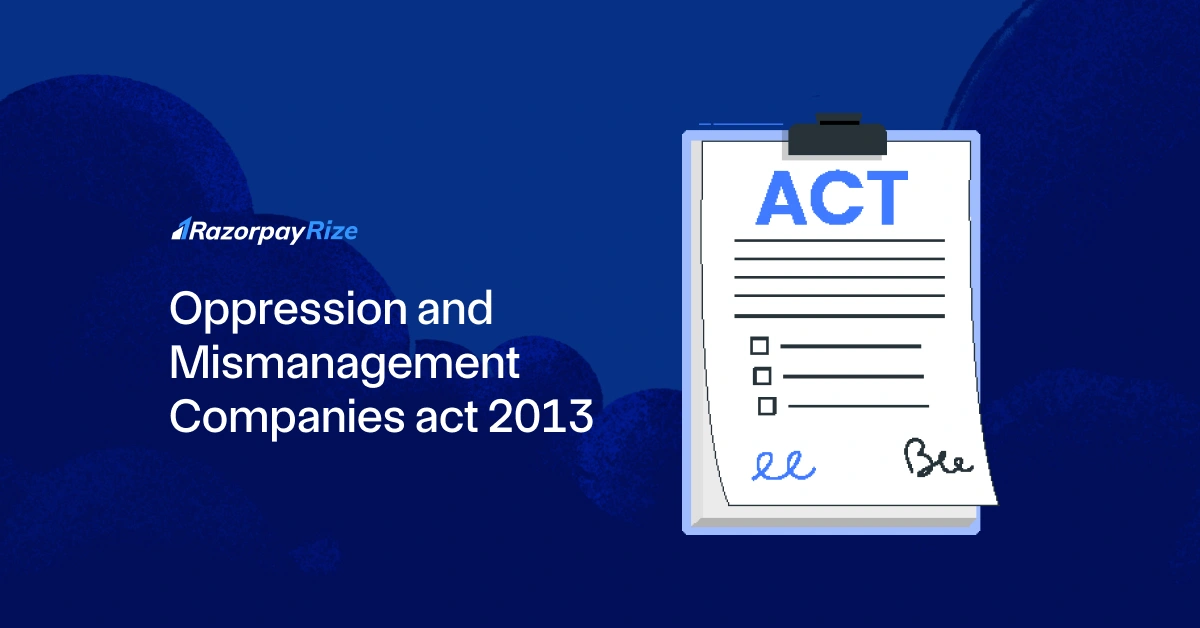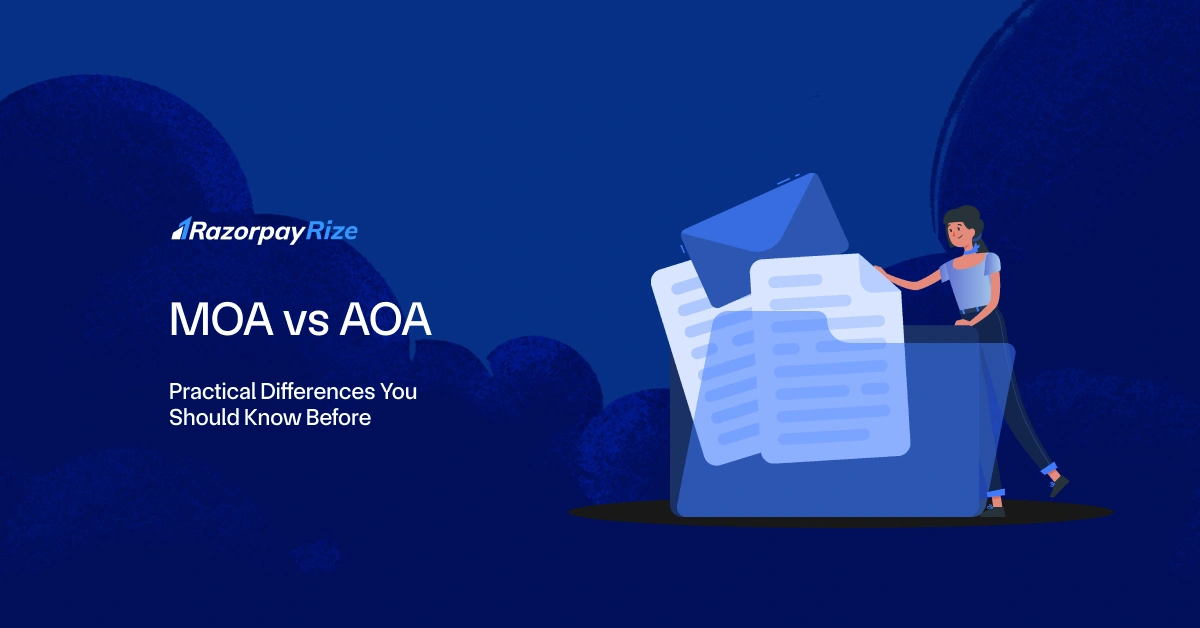A Private Limited Company is a voluntary business association with a distinct name and limited liability. It is a separate legal entity from its members, meaning it has its own rights and obligations.
This structure ensures that the company can conduct business, own assets, and enter into contracts independently of its owners. In this article, we will explore the key features of a private limited company in India.
Table of Contents
Company is a Separate Legal Entity
A company is recognised as a separate legal entity, distinct from its shareholders. Even if it is fully owned by a single person or a group, the company maintains its independent status. This distinction ensures the company can continue existing regardless of changes in ownership.
However, while a company has legal recognition, it is not considered a citizen and cannot claim fundamental rights granted to individuals.
Example
Suppose John and Mary start a bakery and register it as a private limited company (e.g., "Sweet Treats Pvt. Ltd."). The company can enter into contracts, own property, and sue or be sued in its own name. If the company faces a lawsuit, John and Mary’s personal assets are protected, and only the company’s assets are at risk
Corporate Taxation
As a separate legal entity, a company is taxed independently from its owners. Corporate tax rates vary based on the type of company, its turnover, and prevailing tax laws. This separation ensures that individual shareholders are not personally liable for the company's tax obligations, reinforcing financial security and stability.
Example
Tech Innovators Pvt. Ltd." earns ₹2 crores in a financial year. The company pays corporate tax at the applicable rate (e.g., 25% for companies with turnover up to ₹400 crore), separate from the personal income tax liabilities of its shareholders. The shareholders are not personally liable for the company’s tax dues.
{{company-reg-cta}}
Limited Liability
Limited liability protects shareholders by restricting their financial responsibility to the amount they have invested in the company. This means that even if the company faces financial losses or legal claims, the personal assets of shareholders remain secure. This feature makes private limited companies an attractive option for entrepreneurs and investors.
Example
If "Green Energy Pvt. Ltd." takes a loan and fails to repay it, the shareholders are only liable up to the amount unpaid on their shares. Their personal assets, such as their homes or personal savings, cannot be used to settle the company’s debts.
Company has Transferability of Shares
Shares in a company can be transferred freely unless restricted by the company's articles of association. This feature enhances liquidity, allowing investors to buy or sell shares easily.
While shares of public companies are freely transferable, private companies may impose certain restrictions on share transfers to maintain control over ownership.
Example
A shareholder in "Family Foods Pvt. Ltd." wants to transfer shares to her son. She can do so, provided the company’s Articles of Association allow it and the required approvals are obtained. This enables her to pass on ownership without affecting the company’s existence.
Company is a Juristic Person
Under the Companies Act, a company is considered a juristic person, meaning it has legal rights and obligations similar to a natural person. However, an authorised individual must represent it in legal matters, usually a Board of Directors or a specifically empowered Director.
While a company can file lawsuits, it cannot take an oath or serve as a witness in court, as these actions require a natural person.
Example
"Urban Developers Pvt. Ltd." can purchase land, enter into contracts, and hire employees in its own name. It is treated as a legal person, distinct from its shareholders, and can enforce its rights in court through an authorized representative.
Kickstart Your Business Journey Today!
Register your company hassle-free with Razorpay Rize and get expert guidance every step of the way.
Company has Perpetual Succession
A company's existence is independent of changes in ownership or shareholder status. Even if a majority shareholder (owning 99.99% of shares) passes away, the company continues to operate until it is formally wound up. This ensures stability and continuity in business operations.
Example
"Dabur India Ltd." was incorporated in 1884 and has continued to exist and operate despite changes in ownership, management, or the death of shareholders. The company’s existence is not affected by such changes and continues until it is formally dissolved
Common Seal (If Applicable)
A common seal acts as the official signature of the company, used to authenticate important documents like contracts and deeds. While the Companies Act of 2013 has made it optional for private companies, some organisations still choose to adopt it for added authenticity and formal recognition.
Example
"Metro Pvt. Ltd." adopts a common seal as its official signature. When signing a property purchase agreement, the document is stamped with the company’s common seal, signifying its authenticity and approval by the board of directors. While optional, some companies still use it for formal documents
Decree Against Company & Corporate Veil
A company is generally not liable for an employee's wrongful acts unless they occur within the scope of employment. For liability to arise, the wrongful act must be directly linked to business operations rather than simply occurring during work hours.
The "corporate veil" protects shareholders from personal liability, but courts can lift this veil in cases of fraud or misconduct.
Example
An employee of "RapidMove Logistics Pvt. Ltd." causes damage to a client’s goods while making a delivery as part of his job. The client sues the company, not the employee personally. However, if the directors used the company to commit fraud, the court could hold them personally liable by lifting the corporate veil.
Company can Own Property
A company, as a separate legal entity, can own property in its name, and its assets are distinct from those of its members. Members do not have direct ownership over company assets but may have a right to claim remaining assets after the company is wound up.
Example
"TechHive Innovations Pvt. Ltd." purchases office equipment and furniture. These assets are owned by the company itself, not by any individual shareholder or director. If a shareholder leaves, the equipment still belongs to the company.
Company can be Trustee
A company can act as a trustee if its Memorandum of Association (MoA) permits it. The objects clause in the MoA defines the company's ability to function as a trustee. Companies often act as trustees in managing trusts, employee benefit funds, or asset management services, ensuring structured administration of assets.
Example
"SecureTrust Pvt. Ltd." is appointed as the trustee to manage a scholarship fund for underprivileged students. The company manages the fund’s assets and disburses scholarships according to the trust’s rules.
Capacity to Sue and Be Sued
As a separate legal entity, a company has the right to initiate legal proceedings and can also be sued in its own name. This ensures accountability and allows the company to protect its rights, enforce contracts, and address disputes independently of its owners or directors.
Example
"PureWater Solutions Pvt. Ltd." discovers that a supplier has delivered defective water filters. The company files a lawsuit against the supplier in its own name. Similarly, if the company fails to pay its rent, the landlord can sue the company directly.
Importance of Understanding Company Features
Understanding these features is crucial for ensuring legal compliance and making informed business decisions. It helps entrepreneurs, investors, and stakeholders navigate corporate operations effectively while minimising risks. Recognising the legal and financial implications of these features enables better decision-making in establishing and managing a company.
Frequently Asked Questions
Private Limited Company
(Pvt. Ltd.)
- Service-based businesses
- Businesses looking to issue shares
- Businesses seeking investment through equity-based funding
Limited Liability Partnership
(LLP)
- Professional services
- Firms seeking any capital contribution from Partners
- Firms sharing resources with limited liability
One Person Company
(OPC)
- Freelancers, Small-scale businesses
- Businesses looking for minimal compliance
- Businesses looking for single-ownership
Private Limited Company
(Pvt. Ltd.)
- Service-based businesses
- Businesses looking to issue shares
- Businesses seeking investment through equity-based funding
One Person Company
(OPC)
- Freelancers, Small-scale businesses
- Businesses looking for minimal compliance
- Businesses looking for single-ownership
Private Limited Company
(Pvt. Ltd.)
- Service-based businesses
- Businesses looking to issue shares
- Businesses seeking investment through equity-based funding
Limited Liability Partnership
(LLP)
- Professional services
- Firms seeking any capital contribution from Partners
- Firms sharing resources with limited liability
Frequently Asked Questions
What are the main features of a company?
The main features of a company include:
- Separate Legal Entity – The company exists independently of its owners.
- Limited Liability – Shareholders' liability is limited to their investment.
- Perpetual Succession – The company continues to exist despite changes in ownership.
- Corporate Taxation – A company is taxed separately from its shareholders.
- Transferability of Shares – Shares can be transferred, subject to company rules.
- Juristic Person – The company can enter contracts, own assets, and sue or be sued.
- Ownership of Property – The company can own property in its own name.
- Capacity to Sue and Be Sued – A company can initiate or face legal action.
- Common Seal (if applicable) – Some companies use a common seal as an official signature.
- Corporate Veil – Shareholders are not personally liable for the company's actions unless the veil is lifted due to fraud or misconduct.
What is perpetual succession in a company?
Perpetual succession means that a company's existence is not affected by changes in ownership, shareholder deaths, or resignations. The company continues to operate until it is legally dissolved or wound up. This ensures business continuity regardless of individual ownership changes.
What is a separate legal entity in a company?
A separate legal entity means that the company is recognised as an independent legal person, distinct from its shareholders or directors. This allows the company to enter contracts, own property, sue, and be sued in its own name, ensuring that liabilities and obligations belong to the company, not its owners.
Can a company buy property in its own name?
Yes, a company can buy and own property in its own name. Since it is a separate legal entity, the assets owned by the company belong to it, not the shareholders. Shareholders do not have direct ownership over company assets but may have a claim to remaining assets if the company is wound up.








_.webp)







